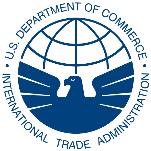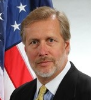The ITA is responsible for promoting U.S. industry interests in international trade. The agency provides market intelligence to U.S. exporters, ensures their access to international markets and enforces foreign compliance with international trade agreements—in part by regulating unfair competition provisions and enforcing rules governing dumped and subsidized imports from foreign countries. The agency develops and implements the government’s foreign trade policy and acts as an advisor for the same.
Most functions performed by the ITA have their origins in the Bureaus of Statistics and Manufacturers in the Department of Commerce and Labor, established in 1903. The Bureau of Foreign and Domestic Commerce was established in 1912 to develop and promote domestic manufacturing industries and related markets both in the U.S. and abroad.
|
Top 10 Contractors
|
|
|
Daniel J Edelman Inc
|
$18,289,725
|
|
Bae Systems PLC
|
$8,439,830
|
|
The Mil Corporation
|
$4,871,344
|
|
C I C Research Inc
|
$4,167,293
|
|
Accenture Ltd
|
$2,659,931
|
|
Bae Systems Information Technology LLC
|
$2,051,453
|
|
Fujitsu Limited
|
$1,998,434
|
|
Furmanite Corporation
|
$1,735,981
|
|
Square One Armoring Services Co
|
$1,269,379
|
|
Commonwealth Trading Partners Inc.
|
$1,206,000
|
|
Top 5 Congressional Districts Where Work Has Been Performed
|
|
|
District of Columbia (Eleanor Holmes Norton)
|
$37,890,052
|
|
Illinois 07 (Danny K. Davis)
|
$3,504,475
|
|
Virginia 08 (Jim Moran)
|
$2,528,992
|
|
Maryland 05 (Steny H. Hoyer)
|
$2,363,790
|
|
California 53 (Susan A. Davis)
|
$1,811,947
|
Contract Announcement
(by Michael Anthony Lawrence, Social Science Research Network)
- Table of Contents
- Overview
- History
- What it Does
- Where Does the Money Go
- Controversies
- Suggested Reforms
- Comments
- Leave a comment


Kenneth Hyatt, an attorney with a background in conflict resolution, took over as acting under secretary of the International Trade Administration (ITA) in 2016.
Hyatt is from the Washington, D.C., area. He attended Sidwell Friends School, where many children of presidents, other government figures and those in the media have gone. Hyatt went on to Yale, where he earned a B.A. in economics and political science in 1979, studied in Germany on a Fulbright scholarship and earned a J.D. from Harvard Law in 1982.
Hyatt worked beginning in 1983 for Bain & Co. in Boston, London and Munich. He struck out on his own in 1989 as a principal and partner in Conflict Management, Inc., which advised clients on conflict management and negotiations. He founded a similar firm, CMI New York, in 1997. Among other things, that company trained negotiators involved in constitutional talks between the old South African government and the African National Congress. Hyatt started a third such company, CM Partners, in 2002.
He left the private sector in 2010 to become a senior adviser for trade issues in the Commerce Department. The following year, he was made Deputy Assistant Secretary for Services, where he helped develop trade policies and served until 2012, when he was named Deputy Under Secretary for International Trade, where he oversaw the day-to-day operations of the ITA. Hyatt became acting under secretary of the agency upon the departure of Stefan Selig.
Hyatt and his wife, Nancy, have two children. He speaks German and is a big NBA fan.
-Steve Straehley
To Learn More:

On November 6, 2013, President Barack Obama nominated mergers and acquisition specialist Stefan M. Selig to be his under secretary of Commerce for International Trade and head the International Trade Administration. President Obama was forced to renominate Selig on January 6, 2014, because his nomination had not been acted upon by the U.S. Senate by the end of the year. In that post, Selig will be promoting U.S. trade interests, including ensuring access to foreign markets and enforcing fair-trade legislation.
Selig was born in New York and grew up on Manhattan’s Upper East Side. He attended the Dalton School, graduating in 1980. Selig went to Wesleyan University in Connecticut as an undergraduate, earning his B.A. in 1984.
Upon graduation, Selig briefly considered making the Marine Corps his career, but went into business instead, joining First Boston in the mergers and acquisitions department. He also earned an MBA from Harvard Business School in 1988, and joined the investment bank Wasserstein Perella &Co. that year as an original member. He then became a partner at Berenson Minella & Co., an investment banking boutique, where he organized several high-profile buyouts, including the $65 million+ takeovers by Chemical Venture Partners and Apollo Advisors of Gerber Products Co.’s Buster Brown subsidiary, the acquisition by Castle Harlan Inc. of MAG Aerospace Industries Inc. from Vestar Capital Partners Inc., and Chemical Venture Partners purchase of Chiquita Brands International’s Speciality Meat Group.
Selig joined UBS in 1994 as head of its financial sponsor group as co-head of mergers and acquisitions, and moved to Société Generale in 1998 before landing at Banc of America Securities in 1999, rising to global head of mergers and acquisitions, vice chairman of global investment banking and, in 2009, executive vice chairman of global corporate and investment banking for Bank of America.,
Selig’s work included the initial public offering of Re/Max real estate brokers and the sale of Yankee Candle to Jarden Corp.
Shortly after Selig’s original nomination to the Commerce post, there was some controversy around a $9 million bonus he received upon leaving the bank. Many banks do offer such bonuses to senior executives leaving for high government or regulatory posts.
Selig is expected to continue helping the United States negotiate the Trans Pacific Partnership trade pact. The deal is controversial for several reasons, including the fact that it contains provisions that would empower corporations to sue governments to demand compensation for laws and regulations they claim undermine their interests.
Selig is married to Heidi Selig. and he previously sat on the board of New York’s Lincoln Center for the Performing Arts.
-Steve Straehley, David Wallechinsky
To Learn More:
White House Names Senior Bank of America Executive to Commerce Post (by Peter Lattman, New York Times)
Obama Admin’s TPP Trade Officials Received Hefty Bonuses From Big Banks (by Lee Fang, Republic Report)
Obama’s Secret International Trade Treaty Caving on Environmental Protections (by Noel Brinkerhoff, AllGov)
- Latest News
- D.C. Public Schools will Teach all Second-Graders to Ride a Bike
- New Rule in Germany Limits Sales of Sex-Themed E-Books to 10pm to 6am
- What Happened to the 6-Year-Old Tibetan Boy the Chinese Government Kidnapped 20 Years Ago?
- U.S. Ambassador to Turkey Photoshops his Hair Color to Mock Turkish Mayor
- Mystery Artist Calls Attention to Unfixed Potholes by Drawing Penises around Them
The ITA is responsible for promoting U.S. industry interests in international trade. The agency provides market intelligence to U.S. exporters, ensures their access to international markets and enforces foreign compliance with international trade agreements—in part by regulating unfair competition provisions and enforcing rules governing dumped and subsidized imports from foreign countries. The agency develops and implements the government’s foreign trade policy and acts as an advisor for the same.
Most functions performed by the ITA have their origins in the Bureaus of Statistics and Manufacturers in the Department of Commerce and Labor, established in 1903. The Bureau of Foreign and Domestic Commerce was established in 1912 to develop and promote domestic manufacturing industries and related markets both in the U.S. and abroad.
|
Top 10 Contractors
|
|
|
Daniel J Edelman Inc
|
$18,289,725
|
|
Bae Systems PLC
|
$8,439,830
|
|
The Mil Corporation
|
$4,871,344
|
|
C I C Research Inc
|
$4,167,293
|
|
Accenture Ltd
|
$2,659,931
|
|
Bae Systems Information Technology LLC
|
$2,051,453
|
|
Fujitsu Limited
|
$1,998,434
|
|
Furmanite Corporation
|
$1,735,981
|
|
Square One Armoring Services Co
|
$1,269,379
|
|
Commonwealth Trading Partners Inc.
|
$1,206,000
|
|
Top 5 Congressional Districts Where Work Has Been Performed
|
|
|
District of Columbia (Eleanor Holmes Norton)
|
$37,890,052
|
|
Illinois 07 (Danny K. Davis)
|
$3,504,475
|
|
Virginia 08 (Jim Moran)
|
$2,528,992
|
|
Maryland 05 (Steny H. Hoyer)
|
$2,363,790
|
|
California 53 (Susan A. Davis)
|
$1,811,947
|
Contract Announcement
(by Michael Anthony Lawrence, Social Science Research Network)
Comments


Kenneth Hyatt, an attorney with a background in conflict resolution, took over as acting under secretary of the International Trade Administration (ITA) in 2016.
Hyatt is from the Washington, D.C., area. He attended Sidwell Friends School, where many children of presidents, other government figures and those in the media have gone. Hyatt went on to Yale, where he earned a B.A. in economics and political science in 1979, studied in Germany on a Fulbright scholarship and earned a J.D. from Harvard Law in 1982.
Hyatt worked beginning in 1983 for Bain & Co. in Boston, London and Munich. He struck out on his own in 1989 as a principal and partner in Conflict Management, Inc., which advised clients on conflict management and negotiations. He founded a similar firm, CMI New York, in 1997. Among other things, that company trained negotiators involved in constitutional talks between the old South African government and the African National Congress. Hyatt started a third such company, CM Partners, in 2002.
He left the private sector in 2010 to become a senior adviser for trade issues in the Commerce Department. The following year, he was made Deputy Assistant Secretary for Services, where he helped develop trade policies and served until 2012, when he was named Deputy Under Secretary for International Trade, where he oversaw the day-to-day operations of the ITA. Hyatt became acting under secretary of the agency upon the departure of Stefan Selig.
Hyatt and his wife, Nancy, have two children. He speaks German and is a big NBA fan.
-Steve Straehley
To Learn More:

On November 6, 2013, President Barack Obama nominated mergers and acquisition specialist Stefan M. Selig to be his under secretary of Commerce for International Trade and head the International Trade Administration. President Obama was forced to renominate Selig on January 6, 2014, because his nomination had not been acted upon by the U.S. Senate by the end of the year. In that post, Selig will be promoting U.S. trade interests, including ensuring access to foreign markets and enforcing fair-trade legislation.
Selig was born in New York and grew up on Manhattan’s Upper East Side. He attended the Dalton School, graduating in 1980. Selig went to Wesleyan University in Connecticut as an undergraduate, earning his B.A. in 1984.
Upon graduation, Selig briefly considered making the Marine Corps his career, but went into business instead, joining First Boston in the mergers and acquisitions department. He also earned an MBA from Harvard Business School in 1988, and joined the investment bank Wasserstein Perella &Co. that year as an original member. He then became a partner at Berenson Minella & Co., an investment banking boutique, where he organized several high-profile buyouts, including the $65 million+ takeovers by Chemical Venture Partners and Apollo Advisors of Gerber Products Co.’s Buster Brown subsidiary, the acquisition by Castle Harlan Inc. of MAG Aerospace Industries Inc. from Vestar Capital Partners Inc., and Chemical Venture Partners purchase of Chiquita Brands International’s Speciality Meat Group.
Selig joined UBS in 1994 as head of its financial sponsor group as co-head of mergers and acquisitions, and moved to Société Generale in 1998 before landing at Banc of America Securities in 1999, rising to global head of mergers and acquisitions, vice chairman of global investment banking and, in 2009, executive vice chairman of global corporate and investment banking for Bank of America.,
Selig’s work included the initial public offering of Re/Max real estate brokers and the sale of Yankee Candle to Jarden Corp.
Shortly after Selig’s original nomination to the Commerce post, there was some controversy around a $9 million bonus he received upon leaving the bank. Many banks do offer such bonuses to senior executives leaving for high government or regulatory posts.
Selig is expected to continue helping the United States negotiate the Trans Pacific Partnership trade pact. The deal is controversial for several reasons, including the fact that it contains provisions that would empower corporations to sue governments to demand compensation for laws and regulations they claim undermine their interests.
Selig is married to Heidi Selig. and he previously sat on the board of New York’s Lincoln Center for the Performing Arts.
-Steve Straehley, David Wallechinsky
To Learn More:
White House Names Senior Bank of America Executive to Commerce Post (by Peter Lattman, New York Times)
Obama Admin’s TPP Trade Officials Received Hefty Bonuses From Big Banks (by Lee Fang, Republic Report)
Obama’s Secret International Trade Treaty Caving on Environmental Protections (by Noel Brinkerhoff, AllGov)
- Latest News
- D.C. Public Schools will Teach all Second-Graders to Ride a Bike
- New Rule in Germany Limits Sales of Sex-Themed E-Books to 10pm to 6am
- What Happened to the 6-Year-Old Tibetan Boy the Chinese Government Kidnapped 20 Years Ago?
- U.S. Ambassador to Turkey Photoshops his Hair Color to Mock Turkish Mayor
- Mystery Artist Calls Attention to Unfixed Potholes by Drawing Penises around Them





Comments